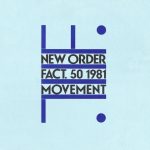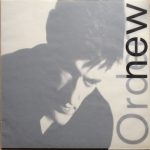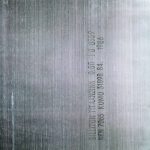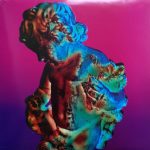New Order
New Order are an English rock band formed in 1980, currently comprising Bernard Sumner, Stephen Morris, Gillian Gilbert, Phil Cunningham and Tom Chapman. The band was formed in 1980 by Sumner, Morris, and Peter Hook, who were the remaining members of post-punk group Joy Division following the suicide of vocalist Ian Curtis. They added Gilbert (keyboards and guitars) later that year.
By combining post-punk with an increasing influence from electronic and dance music, New Order became one of the most critically acclaimed and influential bands of the 1980s. Though the band’s early years were shadowed by the legacy of Joy Division, their experience of the early 1980s New York City club scene saw them incorporate elements of dance rhythms and instrumentation into their work. The band’s 1983 hit “Blue Monday”, the best-selling 12-inch single of all time, is one example of how their sound became increasingly uptempo and electronic.
New Order were the flagship band for Manchester-based independent record label Factory Records. Their unlabelled album sleeves and “non-image” (the band rarely gave interviews and were known for performing short concert sets with no encores) reflected the label’s aesthetic of doing whatever the relevant parties wanted to do, including an aversion to including singles as album tracks until 1984. Throughout their career, the band’s records were art-directed by designer Peter Saville.
The group disbanded in 1993 to work on individual projects, and reunited in 1998. In 2001, Cunningham (guitars, keyboards and synthesisers) replaced Gilbert, who took a sabbatical from the band because of family commitments. In 2007, Hook left the band over personal conflicts. After Hook’s departure, Sumner, Cunningham, and Morris worked on Bad Lieutenant and the band reunited in 2011 without Hook, with Gilbert returning and Chapman replacing Hook on bass. The band members have been involved in several solo projects, such as Sumner’s Electronic and Bad Lieutenant; Hook’s Monaco and Revenge and Gilbert and Morris’ The Other Two.
In September 2015, the band released their tenth studio album, Music Complete.
Between 1977 and 1980, Ian Curtis, Peter Hook, Stephen Morris, and Bernard Sumner were members of the post-punk band Joy Division, often featuring heavy production input from producer Martin Hannett. Curtis committed suicide on 18 May 1980, the day before Joy Division were scheduled to depart for their first American tour, and prior to release of the band’s second album, Closer. The rest of the band decided soon after Curtis’s death that they would carry on. Prior to his death, the members of Joy Division had agreed not to continue under the Joy Division name should any one member leave. On 29 July 1980, the still unnamed trio debuted live at Manchester’s Beach Club. Rob Gretton, the band’s manager for over twenty years, is credited for having found the name “New Order” in an article in The Guardian entitled “The People’s New Order of Kampuchea”. The band adopted this name, despite its previous use for former Stooge Ron Asheton’s band The New Order. The group states that the name New Order (as was also the case with “Joy Division”) does not draw a direct line to Nazism or Fascism.
The band rehearsed with each member taking turns on vocals. Sumner ultimately took the role, as he could sing when he wasn’t playing his guitar. They wanted to complete the line-up with someone they knew well and whose musical skill and style was compatible with their own. Gretton suggested Morris’s girlfriend Gillian Gilbert, and she was invited to join the band in early October 1980, as keyboardist and guitarist. Her first live performance with the band occurred at The Squat in Manchester on 25 October 1980.
The initial release as New Order was the single “Ceremony”, backed with “In a Lonely Place”. These two songs were written in the weeks before Curtis took his own life. With the release of Movement in November 1981, New Order initially started on a similar route as their previous incarnation, performing dark, melodic songs, albeit with an increased use of synthesisers. The band viewed the period as a low point, as they were still reeling from Curtis’ death. Hook commented that the only positive thing to come out of the Movement sessions was that producer Martin Hannett had showed the band how to use a mixing board, which allowed them to produce records by themselves from then on. More recently, Hook indicated a change of heart: “I think Movement gets a raw deal in general really – for me, when you consider the circumstances in which it was written, it is a fantastic record.”
New Order visited New York City again in 1981, where the band were introduced to post-disco, freestyle and electro. The band had taken to listening to Italian disco to cheer themselves up, while Morris taught himself drum programming. The singles that followed, “Everything’s Gone Green” and “Temptation”, saw a change in direction toward dance music.
The Haçienda, Factory Records’ own nightclub (largely funded by New Order) opened in May 1982 in Manchester and was even issued a Factory catalogue number: FAC51. The opening of UK’s first ever superclub was marked by a nearly 23-minute instrumental piece originally entitled “Prime 5 8 6”, but released 15 years later as “Video 5 8 6”. Composed primarily by Sumner and Morris, “Prime 5 8 6″/”Video 5 8 6” was an early version of “5 8 6” that contained rhythm elements that would later surface on “Blue Monday” and “Ultraviolence”.
“Blue Monday” featuring the distinctive kick drum opening
Problems playing this file? See media help.
Power, Corruption & Lies, released in May 1983, was a synthesiser-based outing and a dramatic change in sound from Joy Division and the preceding album, although the band had been hinting at the increased use of technology during the music-making process for a number of years then, including their work as Joy Division. Starting from what earlier singles had hinted, this was where the band had found their footing, mixing early techno music with their earlier guitar-based sound and showing the strong influence of acts like Kraftwerk and Giorgio Moroder. Even further in this direction was the electronically sequenced, four-on-the-floor single “Blue Monday”. Inspired by Klein & MBO’s “Dirty Talk” and Sylvester’s disco classic, “You Make Me Feel (Mighty Real)”, “Blue Monday” became the best-selling independent 12″ single of all time in the UK; however, (much to the chagrin of the buying public) it was not on the track list of Power, Corruption & Lies. This resulted in a sticker being applied to unsold copies of Power, Corruption & Lies album saying, “DOES NOT CONTAIN BLUE MONDAY”. (It was included on the cassette format in some countries, such as Australia and New Zealand and on the original North American CD release of the album, alongside its B-side, “The Beach”.) “Blue Monday” is now included on the 2008 collector’s edition of Power, Corruption & Lies.
The 1983 single “Confusion” firmly established the group as a dance music force, inspiring many musicians in subsequent years. In 1984 they followed the largely synthesised single “Thieves Like Us” with the heavy guitar-drum-bass rumble of “Murder”, a not-too-distant cousin of “Ecstasy” from the Power, Corruption & Lies album.
1985’s Low-Life refined and sometimes mixed the two styles, brandishing “The Perfect Kiss”—the video for which was filmed by Jonathan Demme—and “Sub-culture”. In February 1986, the soundtrack album to Pretty in Pink featuring “Shellshock” was released on A&M Records. An instrumental version of “Thieves Like Us” and the instrumental “Elegia” appeared in the film but were not on the soundtrack album. Later that summer, New Order headlined a line-up that included the Smiths, the Fall, and A Certain Ratio during the Festival of the Tenth Summer at Manchester’s G-Mex.
Brotherhood (1986) divided the two approaches onto separate album sides. The album notably featured “Bizarre Love Triangle” and “Angel Dust” (of which a remixed instrumental version is available on the UK “True Faith” CD video single, under the title “Evil Dust”), a track which marries a synth break beat with Low-Life-era guitar effects. While New Order toured North America with friends Echo & the Bunnymen, the summer of 1987 saw the release of the compilation Substance, which featured the new single “True Faith”. Substance was an important album in collecting the group’s 12-inch singles onto CD for the first time and featured new versions of “Temptation” and “Confusion”—referred to as “Temptation ’87” and “Confusion ’87”. A second disc featured several of the B-sides from the singles on the first disc, as well as additional A-sides “Procession” and “Murder”. The single, “True Faith”, with its surreal video, became a hit on MTV and the band’s first American top 40 hit. The single’s B-side, “1963”—originally planned on being the A-side until the group’s label convinced them to release “True Faith” instead—would later be released as a single in its own right several years later, with two new versions.
In December 1987, the band released a further single, “Touched by the Hand of God”, with a Kathryn Bigelow-directed video parodying glam-metal. The single reached number 20 on the UK Singles Chart and number 1 in the UK Independent Singles chart, but would not appear on an album until the 1994 compilation The Best of New Order.
By this time, the group was heavily influenced by the Balearic sounds of Ibiza, which were making their way into the Haçienda. Partly recorded at Mediterranean Sound studios on Ibiza, Technique was released in February 1989. The album entered the charts at number one in the UK and contained a mix of acid house influence (as on opening track “Fine Time”) and a more traditional rock sound (as on the single “Run 2”). The album is a blend of upbeat, accessible music coupled with blunt, poignant lyrics. During the summer of 1989, New Order supported Technique by touring with Public Image Ltd, Throwing Muses and The Sugarcubes across the United States and Canada in what the press dubbed the “Monsters of Alternative Rock” tour. Around this time, band members also began side projects including Electronic (Sumner with Johnny Marr) and Revenge (Hook with Davyth Hicks). Morris and Gilbert began to work together on outside TV theme production work.
In 1990, New Order recorded the official song of the England national football team’s 1990 World Cup campaign, “World in Motion”, under the ad-hoc band name EnglandNewOrder. The song, co-written with comedian Keith Allen, was the band’s sole number one UK hit. The song was originally planned to be titled “E for England”, however the Football Association vetoed the title upon realising that this was a reference to ecstasy; a drug heavily associated with the Haçienda. (Allen claimed that his original draft lyrics included “E is for England, England starts with E / We’ll all be smiling when we’re in Italy.”) The song also featured chanting from members of the England team and Allen, and a guest rap from left winger John Barnes. It was again produced by Stephen Hague, who the band chose to produce their next album.
The band’s next album Republic was shadowed by the collapse of their longtime label Factory Records. The label had been ailing due to financial difficulties, and was forced to declare bankruptcy in 1992. New Order never had a formal contract with Factory. Although unusual for a major group, this was Factory’s standard practice until the mid-1980s. Because of this, the band, rather than Factory Records, legally owned all of their recordings. This has been cited by Wilson himself as the main reason London Records’ 1992 offer to buy the ailing label fell through. Following Factory’s collapse, New Order signed with London, as did Morris and Gilbert separately for their side project The Other Two, whose debut album was originally intended for release on Factory. Republic, released around the world in 1993, spawned the singles “Regret”—New Order’s highest-charting single in the US—”Ruined in a Day”, “World”, and “Spooky”.
Following the release and promotion of Republic, the band put New Order on hold while focusing on side projects; with The Other Two’s debut album released in 1993. In 1994, a second singles collection was released, entitled The Best of New Order. It featured all of the band’s singles since Substance as well as a few extra tracks: “Vanishing Point” (from 1989’s Technique), “The Perfect Kiss”, “Thieves Like Us”, “Shellshock”, and new recordings of “True Faith”, “Bizarre Love Triangle”, “1963”, and “Round & Round”. The new versions of “True Faith” and “1963” (the latter as a more guitar-oriented version produced by Arthur Baker) were released as singles to promote the album. In the US, the track listing was altered to set it apart from Substance as well as the UK release of The Best of New Order which had been available months prior. This collection was followed by a remix album, The Rest of New Order, featuring a selection of existing and newly commissioned mixes of classic New Order tracks. Some versions contained an extra disc or cassette composed entirely of remixes of “Blue Monday”. “Blue Monday” was released as a single for a third time to promote the collection.





